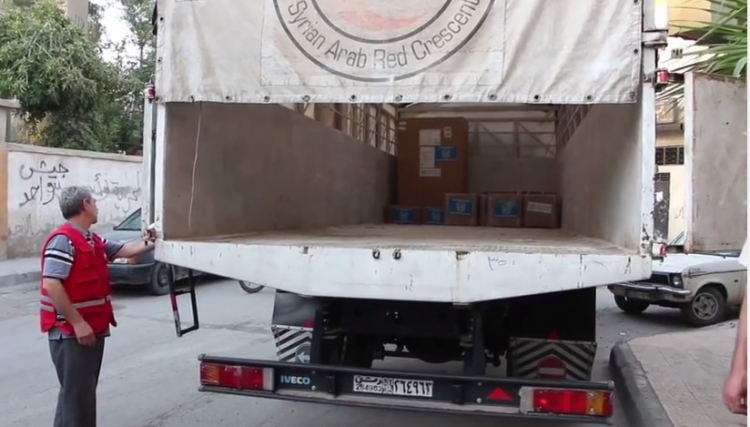Abdul Aziz Al-Khalifa, Baladi News
Activists have shared a footage that shows an almost empty UN aid convoy entering the eastern Ghouta in Damascus countryside.
The footage showed a group of young men gathering around the convoy covered with Red Crescent logo, while one of them commented saying that the convoy contains only 18 relief portions for the whole eastern Ghouta with half a million besieged.
Syrian regime is trying through Red Crescent and the UN, who are accused of contriving with the regime, to deliver a message that it's entering the aid for the civilians by videoing the convoys while crossing to the liberated areas and claiming that they are full with food and medical aid.
The group of "Campaign of Syria" had accused last Wednesday the UN of losing its integrity and impartiality in Syria along with being biased to the Syrian regime. The group also indicated that 88% of the aid were sent to the regime-held areas. The report of the campaign, which is comprising 55 non-governmental organizations, has also accused the United Nations of complying with the regime in drafting strategic documents.
"Campaign of Syria" indicated that the organization has provided a controversial support to the cities that were besieged by regime forces, pointing out that the United Nations systematically failed in classifying and defining the besieged areas.
In this context, Asa'ad Al-Ashi, the executive director of "Syria is Our Home" organization, one of Syria's campaign organizations, said that 88% of the food proportions had been distributed by the UN in the regime-held areas for the sake of ensuring the existence of the UN offices in Damascus, while opposition-held areas received only 12%.
It is noteworthy that the United Nations had entered earlier this month an aid convoy to the city of Darayya in the western countryside of Damascus, which has been besieged by the Syrian regime since four years. It's ironically enough that the aid did not include foodstuffs, but "mosquito nets, an anti-lice shampoo and ointment for scabies", which sparked a wave of discontent among Syrian activists.

